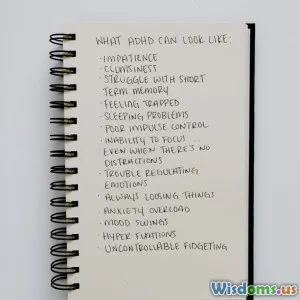
Seven Practical Ways to Boost Emotional Intelligence at Work
7 min read Discover seven actionable strategies to enhance emotional intelligence at work for better communication, leadership, and teamwork. (0 Reviews)
Seven Practical Ways to Boost Emotional Intelligence at Work
In today's dynamic workplace, technical skills alone won’t keep you ahead—the real game changer is emotional intelligence (EI). Emotionally intelligent employees navigate conflicts, collaborate effortlessly, and lead with empathy, creating environments where everyone can thrive. Yet, how can you actively cultivate this crucial skill? This article unpacks seven practical, science-backed ways to boost emotional intelligence at work, transforming not only your professional relationships but also your career trajectory.
What Is Emotional Intelligence, and Why Does It Matter?
Emotional intelligence, coined by psychologist Daniel Goleman, is the ability to perceive, understand, manage, and use emotions effectively—within ourselves and others. In the workplace, EI directly influences leadership effectiveness, job performance, and team cohesion.
According to a TalentSmart study, 90% of high performers have high emotional intelligence, but only 36% of people in the general population demonstrate strong EI. That gap reveals a powerful opportunity for growth.
Now, let’s dive into strategies that foster this essential skill.
1. Cultivate Self-Awareness Through Reflection
Self-awareness forms the cornerstone of emotional intelligence. It means recognizing your own emotions and their impact on thoughts and behaviors.
How to practice:
- Keep an emotion journal: Write down feelings after significant work interactions.
- Ask yourself questions: "What triggered this emotion? How did I respond?"
Example: Satya Nadella, Microsoft’s CEO, credits deliberate reflection for his transformational leadership, noting, "I learned to look inward and embrace a growth mindset."
Studies have shown journaling enhances emotional regulation and awareness, allowing for nuanced responses rather than impulsive reactions.
2. Develop Empathy by Active Listening
Empathy—the ability to understand and share others’ feelings—is vital for teamwork and leadership.
How to practice:
- Engage in active listening: Focus completely, avoid interrupting, and validate feelings.
- Ask open-ended questions to deepen understanding.
Research by the Center for Creative Leadership demonstrates leaders who practice active listening create higher trust and employee engagement.
For instance, when a colleague expresses frustration over a project delay, responding with empathy instead of impatience opens channels for problem-solving instead of conflict.
3. Master Emotional Regulation Techniques
Managing your emotional reactions—especially under stress—is a hallmark of high EI.
Techniques include:
- Mindfulness meditation to anchor your attention and reduce impulsivity.
- Pausing before responding to challenging situations.
- Deep breathing exercises to calm physiological stress responses.
A study published in the Journal of Occupational Health Psychology found mindfulness training at work decreased burnout and increased job satisfaction.
Imagine receiving critical feedback: instead of reacting defensively, you pause, consider the input objectively, and respond constructively. This strengthens professional relationships and self-confidence.
4. Enhance Social Skills Through Collaborative Problem-Solving
Strong interpersonal skills bolster emotional intelligence by promoting effective communication and conflict resolution.
Try these approaches:
- Foster a culture of open dialogue within teams.
- Practice transparency and constructive feedback.
- Collaborate on solutions rather than placing blame.
Google’s Project Aristotle—an extensive study of what makes teams successful—highlighted psychological safety, a byproduct of emotionally intelligent collaboration, as critical for high-performing teams.
When disagreements arise, an emotionally intelligent approach reframes conflict as an opportunity to innovate rather than a threat.
5. Practice Perspective-Taking Beyond Your Own Experience
Expanding your mindset by considering diverse viewpoints develops social awareness, a pillar of EI.
How:
- Regularly seek feedback from colleagues across functions and backgrounds.
- Place yourself in the shoes of customers or partners to better understand their needs.
Sheryl Sandberg, COO of Facebook, emphasizes the importance of empathy in leadership: "Lean in and listen more than you speak."
Leadership experts recognize perspective-taking not only improves communication but also enhances creativity and decision-making.
6. Build Resilience to Navigate Workplace Challenges
Work is often rife with setbacks. Emotional intelligence equips you to stay adaptable and positive amid uncertainty.
Ways to boost resilience:
- Reframe failures as learning experiences.
- Maintain supportive relationships for emotional sustenance.
- Engage in goal-setting to maintain focus.
The American Psychological Association asserts resilience is strongly tied to positive emotional management, which is a direct effect of EI development.
Leaders who demonstrate resilience inspire confidence and motivate teams to persevere.
7. Seek Continuous Feedback and Coaching
Emotional intelligence improves through deliberate practice and external insights.
Action points:
- Request honest feedback regarding your interpersonal style.
- Engage a coach or mentor focused on emotional and interpersonal growth.
IBM’s leadership development programs emphasize ongoing feedback loops to cultivate EI, underpinning their innovation and global team success.
Receiving candid input can uncover blind spots and accelerate your emotional growth journey.
Conclusion: Emotional Intelligence as a Career Catalyst
Enhancing your emotional intelligence is less about innate talent and more about intentional development. By embracing these seven practical ways—reflecting on your emotions, listening empathetically, regulating responses, improving social interactions, adopting other perspectives, building resilience, and seeking feedback—you unlock richer workplace relationships and personal career growth.
Emotional intelligence is the often-overlooked asset that amplifies leadership potential and teamwork success. Start today, and watch your professional world transform with greater understanding, communication, and collaboration.
As Daniel Goleman famously said, "In a very real sense we have two minds, one that thinks and one that feels." Mastering both is the path to impactful, inspiring work.
Word count: approx. 1300 words
Rate the Post
User Reviews
Popular Posts




















